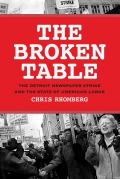Main navigation
 As the Chicago teachers labor dispute stretches into its fourth day, attention has turned to the use of the strike and the state of collective bargaining in America. In an essay for CNN Opinion, Chris Rhomberg, author of the RSF book The Broken Table argues that the Chicago walkout hides a "dramatic historical fact: The strike has almost disappeared from American life":
As the Chicago teachers labor dispute stretches into its fourth day, attention has turned to the use of the strike and the state of collective bargaining in America. In an essay for CNN Opinion, Chris Rhomberg, author of the RSF book The Broken Table argues that the Chicago walkout hides a "dramatic historical fact: The strike has almost disappeared from American life":
The numbers are stark. During the 1970s, an average of 289 major work stoppages involving 1,000 or more workers occurred annually in the United States. By the 1990s, that had fallen to about 35 per year. And in 2009, there were no more than five.
Rhomberg argues that the decline of the strike cannot be attributed fully to changes caused by globalization or technological shifts. Instead, he argues that a series of judicial and executive decisions have made it more difficult for the strike to be used as a tool to push for more cooperation between employers and workers. Particularly since the 1980s, he says, administrative and Supreme Court rulings have allowed to take another approach: declare they have reached an impasse in negotiations, end the bargaining process, and then hire "permanent replacements" for striking workers.
But does this mean, as Rhomberg argues, that we would be "better off" with more strikes? In an interview on NPR's Talk of the Nation, host Neal Conan asked Rhomberg if the competitive pressures of the global economy mean that strikes and collective bargaining put American workers at a disadvantage. Rhomberg replied:
Well, if you look at the record of other industrialized countries, for example, I mean, those countries with high unionization and high levels of productivity have also done really well. That was in Europe, even Canada, for example. So I don't believe it's just the economic competitiveness. In fact, studies have shown that unionized workplaces are as productive or more productive than non-unionized workplaces because employees feel a greater stake in the enterprise.
Rhomberg outlines his labor theory -- what he calls the "policy of judicial repression" -- in his RSF book, which analyzes the history of the mid-1990s Detroit newspaper strike. In a recent review, the Journal of Labor and Society called The Broken Table a "remarkable book":
Rhomberg’s dramatic story is based on exhaustive research. His list of references is an impressive forty-one pages, including books and articles, news stories, academic research, trial documents, judicial and administrative decisions, primary documents, and over 100 interviews.[...]The Broken Table provides an important service by explaining how we got where we are today and how the future can be different.





